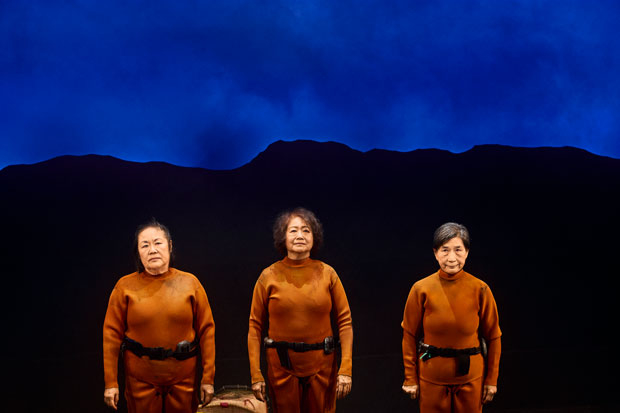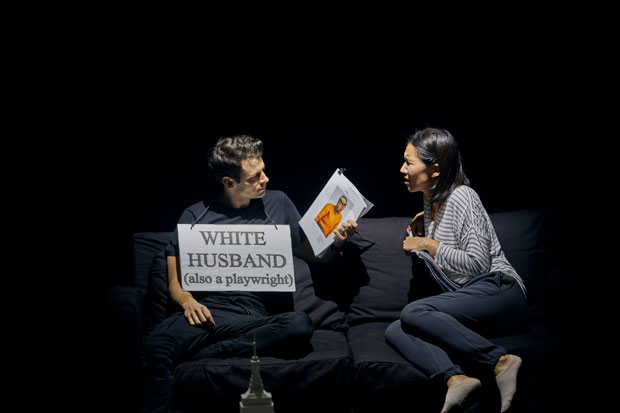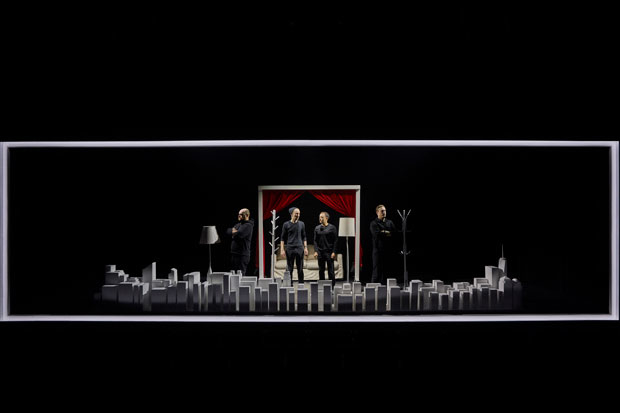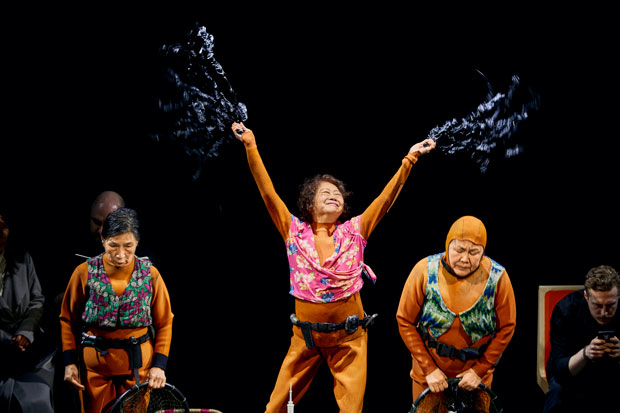Diving for Metatheatrical Satire in Endlings
Celine Song’s poison-pen letter of a play makes its New York premiere at New York Theatre Workshop.

(© Chad Batka)
Some plays come with a statement of intent from one or more of the artists included in the program. With Endlings, making its New York premiere at New York Theatre Workshop, playwright Celine Song has not only made that statement of intent part of the play itself, but she eventually blows it up to grand metatheatrical scale. It's certainly a bold way to announce herself in the city's theater scene, especially since the NYC theater microcosm itself is one of Song's primary targets of satirical attack in the play's second half.
Not that you'd glean that from the more conventional beginning of Endlings. The focus of this initial stretch is three elderly haenyeos, female divers on Korea's Manjae Island who go underwater daily to catch seafood for their villages. We see these three — Han Sol (Wai Ching Ho), Go Min (Emily Kuroda), and Sook Ja (Jo Yang) — interact with each other in amusingly vulgar fashion, embark on their dives (diving into an actual pool toward the back of the stage on Jason Sherwood's set), and lament their dead-end lives. This is fascinating material for a play: These haenyeos exist in a semi-matriarchal society, which even now is rare in a Korea that still leans largely patriarchal. The fact that they're becoming a dying breed in an industrialized modern age means that any work of art that sheds light on their lives is bound to be at least of anthropological interest.

(© Chad Batka)
But then, about 20 minutes in [spoilers follow], another character, Ha Young (Jiehae Park), steps onto the stage and interrupts the action to address us in the audience. Divulging that we have just watched the beginning of her own play, she then proceeds to talk not only about how the haenyeos inspired her, but also about her own family's troubled history, connecting it to her current life as a Korean-Canadian playwright living in Manhattan's East Village and struggling to make a successful living from her art.
That's not the only thing on her mind, though. Turns out, Ha Young has some reservations about writing this culturally specific play for an audience that still skews heavily white. Is she just a token "Asian artist" to whom cultural gatekeepers are all too happy to throw money just to prove to themselves that they're woke? Eventually, such concerns fully take over Endlings, turning an intriguing ethnographic drama into a wacky sketch-comedy revue featuring Ha Young's White Husband (Miles G. Jackson), identified with a placard he wears around his neck that says "WHITE HUSBAND (ALSO A PLAYWRIGHT)" on it. Among the episodes is a sequence in which she and the White Husband attend a play featuring an all-white-male cast (featuring Matt DaSilva, Mark Mauriello, Keith Michael Pinault, and Andy Talen) performing a parody of the kind of upper-middle-class play that still gets produced regularly in New York City.

(© Chad Batka)
Song is certainly right to call out the New York theater scene for its overwhelming whiteness and fumbling attempts at wokeness. Such criticisms, though, might arguably carry more weight coming from someone better established in the theater world. And the sheer broadness of her satire — that all-white-male cast are given snarky lines like "I'm just white lonely" and "Let me just exist / This is interesting to everyone" — makes her attacks often seem lazy. By the time Song gets to the final scene of her play, in which she places Ha Young and Han Sol onstage together in an admittedly lyrical attempt to tie these generational and thematic threads together, we've all but forgotten about those haenyeos in the beginning, overwhelmed instead by Ha Young's, and by extension Song's, own navel-gazing.
Director Sammi Cannold has given Endlings a visually and aurally impressive production, with Sherwood's expansive set design complemented by Bradley King's versatile lighting, Linda Cho's colorful costumes, and Elisheba Ittoop and Ien DeNio's evocative sound design and Ittoop's original music. And the cast is nothing if not committed to the playwright's musings. But high production values can only do so much to soften the blows of this poison-pen letter. Song might rightly believe that the problems of white people are not interesting to everyone, but that doesn't make her own problems inherently more interesting.

(© Chad Batka)









